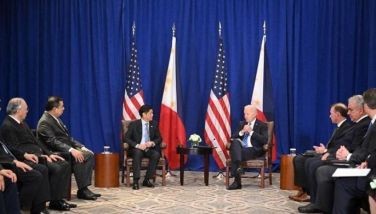More senators join call to review JPEPA
November 2, 2006 | 12:00am
More senators have joined the call for a review of the Japan Philippines Economic Partnership Agreement (JPEPA) and to weed out a controversial provision on the transport of toxic and hazardous wastes from Japan.
Sen. Ralph Recto said there is a need to review JPEPA because a report submitted to Congress by President Arroyo’s own men refuted the capability of the government to handle toxic and hazardous wastes from Japan.
The President and then Japanese Prime Minister Junichiro Koizumi signed the trade deal on Sept. 9 in Helsinki, Finland. Under JPEPA, toxic and hazardous wastes are included on the list of goods that can be shipped to the Philippines from Japan.
"The bottomline is that the country is having a hard time treating and handling the 13 billion kilos of solid waste its 89 million residents generate annually. Thus, the only way to treat Japanese waste is to say ‘Sayonara’ to it," Recto said.
Recto said an environment briefer presented by officials of the Department of Environment and Natural Resources (DENR) in the course of the Senate’s hearing on the agency’s proposed 2007 budget last month painted a country that is a "ticking stinking time bomb" due to the large volume of uncollected garbage.
In Metro Manila alone, 85 percent of the 6,169 tons of garbage generated daily end up in creeks and esteros, Recto said, quoting the DENR report.
The report pictured a grim garbage scenario for Metro Manila with litter output projected to double by year 2010, or to 12,338 metric tons a day or 4.5 million metric tons annually.
"That would make that mountain of trash in Payatas a molehill," Recto said.
He said the DENR report also showed the rest of the country facing a serious garbage problem due to difficulties encountered by local government units in converting dumpsites into sanitary landfills as mandated under the Solid Waste Management Law. There were only seven sanitary landfills in the country as of October.
Sen. Pia Cayetano, for her part, said it was "shocking" to hear some administration officials asserting that there is no need for the Senate to ratify JPEPA.
"I find shocking, to say the least, recent statements from the executive suggesting that JPEPA is already binding and therefore not subject to Senate ratification," Cayetano said.
"If the best interest of the Filipinos is really in their heart, then why not let the Senate scrutinize it?" she asked.
"I reiterate that I am against any agreement that provides for the Philippines accepting waste products for the primary reason that we cannot even manage our own waste at this time - be it biodegradable waste that should be recycled, or toxic waste," Cayetano said in a statement. — With Paolo Romero
Sen. Ralph Recto said there is a need to review JPEPA because a report submitted to Congress by President Arroyo’s own men refuted the capability of the government to handle toxic and hazardous wastes from Japan.
The President and then Japanese Prime Minister Junichiro Koizumi signed the trade deal on Sept. 9 in Helsinki, Finland. Under JPEPA, toxic and hazardous wastes are included on the list of goods that can be shipped to the Philippines from Japan.
"The bottomline is that the country is having a hard time treating and handling the 13 billion kilos of solid waste its 89 million residents generate annually. Thus, the only way to treat Japanese waste is to say ‘Sayonara’ to it," Recto said.
Recto said an environment briefer presented by officials of the Department of Environment and Natural Resources (DENR) in the course of the Senate’s hearing on the agency’s proposed 2007 budget last month painted a country that is a "ticking stinking time bomb" due to the large volume of uncollected garbage.
In Metro Manila alone, 85 percent of the 6,169 tons of garbage generated daily end up in creeks and esteros, Recto said, quoting the DENR report.
The report pictured a grim garbage scenario for Metro Manila with litter output projected to double by year 2010, or to 12,338 metric tons a day or 4.5 million metric tons annually.
"That would make that mountain of trash in Payatas a molehill," Recto said.
He said the DENR report also showed the rest of the country facing a serious garbage problem due to difficulties encountered by local government units in converting dumpsites into sanitary landfills as mandated under the Solid Waste Management Law. There were only seven sanitary landfills in the country as of October.
Sen. Pia Cayetano, for her part, said it was "shocking" to hear some administration officials asserting that there is no need for the Senate to ratify JPEPA.
"I find shocking, to say the least, recent statements from the executive suggesting that JPEPA is already binding and therefore not subject to Senate ratification," Cayetano said.
"If the best interest of the Filipinos is really in their heart, then why not let the Senate scrutinize it?" she asked.
"I reiterate that I am against any agreement that provides for the Philippines accepting waste products for the primary reason that we cannot even manage our own waste at this time - be it biodegradable waste that should be recycled, or toxic waste," Cayetano said in a statement. — With Paolo Romero
BrandSpace Articles
<
>
- Latest
- Trending
Trending
Latest
Trending
Latest
Recommended































